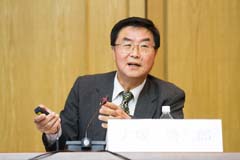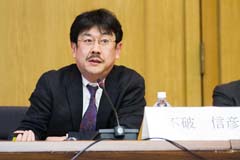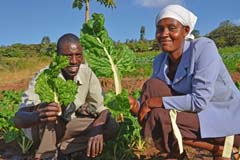TICAD VI in Nairobi: What Should We Propose as a Smart Donor?'JICA-RI's Research Projects Presented at Public Symposium
2016.02.12
The public symposium "TICAD VI in Nairobi: What Should We Propose as a Smart Donor?" was held by the Science Council of Japan and JICA on February 12, 2016, at the JICA Ichigaya Building.
In August 2016, the sixth Tokyo International Conference on African Development (TICAD VI) will be held in Nairobi, Kenya. TICAD VI will be held in Africa for the first time since its launch in 1993. What message should Japan send on this occasion? Keijiro Otsuka, a senior professor at the National Graduate Institute for Policy Studies, and Nobuhiko Fuwa, a professor at Waseda University, who are involved in JICA-RI projects, gave presentations about JICA's initiatives in Africa.
Otsuka's presentation was entitled "Coalition for African Rice Development (CARD): Status and Challenges." CARD is an initiative launched during the 2008 TICAD IV - jointly by JICA and the Alliance for a Green Revolution in Africa (AGRA) - that aims to double rice production in Africa by 2018. Otsuka said CARD is on track to meet its goal, and added, "The approach we should take in Africa is different from the Green Revolution in Asia. African farmers should understand that the success in Asia was not brought about only by the use of improved seeds and chemical fertilizer, but also by improved cultivation practices."

Keijiro Otsuka, a senior professor at the National Graduate Institute for Policy Studies
He explained that it is clear from experimental studies that the key to improving productivity is disseminating cultivation techniques such as improving and smoothing the ridges between rice fields. In order to spread appropriate cultivation practices, it is important to train agricultural extension workers and farmers, he said.
"Further, we must set up a series of initiatives to facilitate infrastructure development such as irrigation, providing credits and supporting mechanization," he added.
Fuwa gave a presentation entitled "The Smallholder Horticulture Empowerment and Promotion (SHEP) Approach: Achievements and the Way Forward." SHEP is a JICA technical cooperation project in Kenya begun in 2006 that aims to improve the livelihoods of smallholders by increasing their marketing ability. The project is now in its third phase and is being widely expanded to various African countries. SHEP is unique in presenting a transition from subsistence to commercial agriculture. Moreover, it also deploys a so-called KAIZEN approach, encouraging farmers to notice problems, then think and act on their own. As of 2015, SHEP had benefited some 15,000 farmers, whose horticulture incomes have doubled on average.

Nobuhiko Fuwa, a professor at Waseda University
In SHEP research, to scientifically assess impacts, the statistical approach of randomized controlled trials (RCTs) needs to be adopted. Fuwa said it is important to share knowledge from successful projects all around the world as a public good, and an effective way to do that is impact evaluation with convincing evidence from RCTs.
Otsuka and Fuwa emphasized that for African development, we should aim for systematic assistance by starting with human resources training, then by making infrastructure investments, and in the case of the manufacturing industry, by also attracting direct investment. To let the world know that Japanese assistance is effective, they emphasized, close cooperation between researchers and practitioners is essential.
During the question and answer session, regarding an effective development strategy for developing countries, Otsuka said researchers and practitioners should work together to unpack functioning factors of successful development, so that Japan can lead the discussion in the world. Fuwa said the scientific evidence should be organized so it can stand up to international debate.
Speakers from private companies and the Ministry of Foreign Affairs took the stage at the symposium, as did JICA President Shinichi Kitaoka. At the symposium, it was confirmed that there are expectations of strengthened ties among the public and private sectors and academia, and for them together to help Japan take leadership in support of effective international cooperation.

Participating farmers in the Smallholder Horticulture Empowerment Project

事業事前評価表(地球規模課題対応国際科学技術協力(SATREPS)).国際協力機構 地球環境部 . 防災第一チーム. 1.案件名.国 名: フィリピン共和国.

事業事前評価表(地球規模課題対応国際科学技術協力(SATREPS)).国際協力機構 地球環境部 . 防災第一チーム. 1.案件名.国 名: フィリピン共和国.

事業事前評価表(地球規模課題対応国際科学技術協力(SATREPS)).国際協力機構 地球環境部 . 防災第一チーム. 1.案件名.国 名: フィリピン共和国.

事業事前評価表(地球規模課題対応国際科学技術協力(SATREPS)).国際協力機構 地球環境部 . 防災第一チーム. 1.案件名.国 名: フィリピン共和国.

事業事前評価表(地球規模課題対応国際科学技術協力(SATREPS)).国際協力機構 地球環境部 . 防災第一チーム. 1.案件名.国 名: フィリピン共和国.